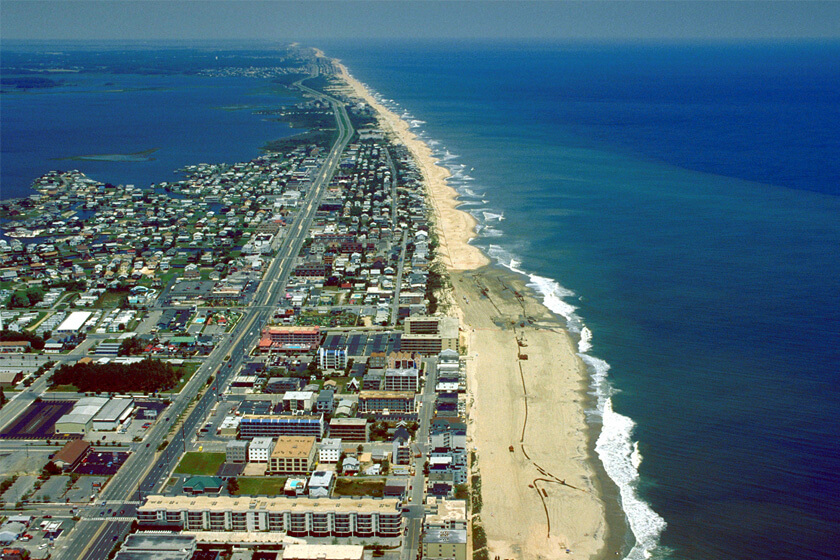A 5-state survey of coastal community residents
(New York, New Jersey, Delaware, Maryland, Virginia)
SUMMARY
Monmouth University, through the initiative and interdisciplinary resources of its Urban Coast Institute and Polling Institute, conducted a public opinion survey of coastal residents in the Mid-Atlantic region in the spring of 2017 on attitudes toward different aspects of a proposed Ocean Action Plan for the region. Because these institutes conducted a similar survey in 2009, this project is also able to track opinion changes among Mid-Atlantic coastal residents, particularly after a number of damaging storms hit this area including the Sandy disaster in 2012.
This unique study of coastal residents is one of three surveys on the Mid-Atlantic Ocean Action Plan, including a survey of key regional stakeholders (Fall 2016) and a survey of all residents from six states that make up the region (Summer 2017). These surveys are part of a larger Urban Coast Institute project to support mapping and facilitate dialogue about ocean planning in the Mid-Atlantic region. It was made possible through the generous support of a grant from the Gordon and Betty Moore Foundation.
The sample for the survey was divided into eight coastal regions: New York East (Suffolk coastal communities), New York West (Nassau), New Jersey North (Monmouth/Ocean), New Jersey South (Atlantic/Cape May), Delaware (Sussex), Maryland (Worcester), Virginia North (Accomack/Northampton) and Virginia South (Virginia Beach). A total of 1,005 permanent residents of coastal towns were interviewed by telephone from April 26 to May 31, 2017. The survey results have a ±3.1% margin of error.
Coastal Community Life
Most Mid-Atlantic coastal residents own their homes and many are long-time residents of their towns.
- Almost three-quarters (74%) of Mid-Atlantic coastal residents own their homes. Half (48%) of coastal residents live a mile or more from the beach, 38% live within a few blocks of the beach, and 13% live on the water.
- A majority (51%) of coastal residents are long-time residents of their towns, living there for more than 20 years or their whole lives.
Coastal residents take advantage of the activities their location provides them.
- Nearly 9-in-10 residents (89%) have swum, sunbathed, or walked along the shore of beaches near their homes.
- 58% have boated, canoed, kayaked, or jet-skied, and 51% have gone fishing, crabbing, or clamming in the waters near their homes.
- One-fifth of coastal residents own a boat.
Community Issues and Coastal Awareness
The vast majority of Mid-Atlantic coastal residents say that protecting the coast should be a high priority for their towns. They also say that coastal and ocean water pollution and sea level rise and storms are very serious concerns.
- Out of five issues that their towns might face, protecting the coastal and ocean environment is the issue that Mid-Atlantic coastal residents most often identify as a high priority for their towns (81% say it is a high priority). This is followed by improving public education (71% say it is a high priority), improving the local economy and creating jobs (65%), lowering taxes (60%), and controlling growth and development (50%).
- Nearly all coastal residents (95%) say the condition of the ocean and beaches are at least somewhat important to their local economies.
- Six-in-ten Mid-Atlantic coastal residents rate coastal and ocean water pollution (62%) and sea level rise and storms (60%) as very serious concerns, 53% say the same about the loss of wetlands and coastal habitats, and slightly under half say the amount of development along the coast (46%) and the disappearance of small-scale marine and fishing businesses (45%) are very serious concerns.
- Residents are much more concerned today about the threat of sea level rise and storm risks than in 2009 (+19 points to 60% saying it is a very serious concern), with all states except Maryland experiencing a double-digit increase.
Most residents have some knowledge about coastal and ocean issues in their local communities and recognize the impact the quality of ocean ecosystems can have in four different areas.
- 74% of Mid-Atlantic coastal residents say they know at least some about local coastal environment issues and 73% recognize that what happens along their coast affects the coasts of other states.
- 76% of coastal residents say the quality of ocean ecosystems is very important for protecting the global environment, 69% say it is very important for growing the local economies of coastal communities, 61% say it is very important for maintaining strong national security, and 59% say it is very important for developing new sources of energy.
Coastal Policy
Mid-Atlantic coastal residents tend to give the government poor marks on its handling of coastal issues. They say they are willing to pay more in taxes in order to protect coastal waters, and they believe it is important for the government to maintain a database with information about the health of the ocean.
- Four-in-ten coastal residents (39%) say the government is doing an excellent or good job protecting coastal wetlands and wildlife habitats. About one-third say the government is doing an excellent or good job managing fish and other marine life (32%) and collecting data that tracks the health of the ocean’s ecosystem (31%). Slightly under a third (28%) say the same about the government’s efforts to manage growth and development in coastal communities.
- Residents from northern Virginia, southern New Jersey, and Maryland tend to be slightly more positive about the government’s efforts to protect coastal wetlands and wildlife habitats and manage fish and other marine life, with roughly 40-50% saying the government is doing an excellent or good job.
- Opinion is split on current efforts to protect local waters and beaches. Almost half of coastal residents (48%) say efforts are about right, but 42% say they are too little. Very few residents (5%) feel efforts are too much.
- Coastal residents of Maryland and Virginia are most likely to say efforts to protect local waters and beaches are about right (59%), while coastal residents of New York (47%) and New Jersey (45%) are most likely to say efforts are too little.
- A majority (68%) of residents say they are willing to pay more in taxes to protect the coastal waters, shoreline, and beaches in their towns.
- 67% of Mid-Atlantic coastal residents say it is very important for government to collect information and maintain databases on the health of the oceans, while another 24% say this is somewhat important.
Opinions are mixed about how much input into coastal management decisions the federal government gives various stakeholders. Support for off-shore energy production has declined since 2009, and residents are generally supportive of certain restrictions placed on areas of the ocean.
- Just under half (47%) of coastal residents say the government does not give enough input to state and local officials or local fishing and marine industries into decisions about managing the ocean. About a third (36%) say the federal government does not give the mining and energy industries enough input into these decisions.
- 72% of coastal residents say they would support placing electricity-generating windmills off the coast as long as they are not visible from the shoreline, 52% would support visible windmills, and only 22% would support off-shore oil and gas drilling.
- Almost 6-in-10 residents (63%) would support designating certain areas of the ocean where fishing would be restricted, and 78% would support such restrictions on oil and gas drilling.
Climate Change
The vast majority of Mid-Atlantic coastal residents believe in climate change. They are split on how prepared they think their towns are for sea level rise and storm risks.
- 83% of coastal residents believe in climate change compared to 15% who do not.
- 48% of coastal residents believe climate change has hurt their local fishing industries.
- Roughly three-quarters of coastal residents believe reports of future sea level rise and storm and flood damage are either accurate (59%) or underestimated (15%), but 23% say they are exaggerated.
- 36% of coastal residents say human activity is the main cause of climate change, 19% say natural changes are the main cause, and 42% say both are equally to blame. Coastal residents in Virginia are least likely to say human activity is the main cause of climate change (19% say this) but most likely to say climate change and natural changes are equally to blame (61%).
- 57% of Mid-Atlantic coastal residents say their communities are prepared to deal with the threats of sea level rise and coastal storms, while 40% say their towns are not prepared.
- Besides the 18% who already say their communities are very prepared for the threats of sea level rise and storms, 42% of coastal residents say it is possible to be prepared, 21% say it is not possible, and 19% say they are not sure.
The questions referred to in this report are as follows:
A. LIVING ON THE COAST
A1.Do you own or rent this apartment or house? [ If RENT : Do you rent this for most of the year or just for short vacation periods?]
A2.Is this home a waterfront property right on the beach or bay, within a few blocks of the beach or bay, within one mile, within five miles, or farther away?
A3.How much of the year do you live in this home – 10 to 12 months, 6 to 9 months, or less than 6 months?
A4.How many years have you lived in this town, or have you lived here all your life?
B. COASTAL COMMUNITY ISSUES
B1.Here are some issues that your town may have to deal with. After I read each one, please tell me whether it should be a high, medium, or low priority.
[ ITEMS WERE ROTATED ]
A. Improving public education
B. Controlling growth and development
C. Lowering taxes
D. Protecting the coastal and ocean environment
E. Improving the local economy and creating jobs
B2.How much do you feel you know about coastal environment issues in your local area – a great deal, some, just a little, or nothing at all?
B3.Do you think current efforts to protect coastal waters and beaches in your local area are too much, too little, or about right?
B4.How important is the condition of the ocean and beaches to the economy in your area — very, somewhat, not too, or not at all important?
B5.Would you support or oppose efforts to protect the coastal waters, shoreline, and beaches in your town if it meant you would have to pay more in local taxes?
B6.Please tell me if you think each of the following is a very serious, somewhat serious, not too serious, or not at all serious concern in your area?
[ ITEMS WERE ROTATED ]
A. Coastal and ocean water pollution
B. The loss of wetlands and coastal habitats
C. Sea level rise and increasing risk from storms
D. The amount of development along the coast
E. Small-scale marine and fishing businesses are disappearing
B7.How much do you think what happens along your local coast affects what happens along the coast of [ READ IN NAME OF ADJACENT STATE(S) ] – a great deal, some, just a little, or nothing at all?
C. COASTAL AND OCEAN POLICY
[ QUESTIONS C1 & C2 WERE ROTATED ]
C1.Do you support or oppose designating certain areas of the ocean for special protection where fishing would be restricted?
C2.Do you support or oppose designating certain areas of the ocean for special protection where oil and gas drilling would be restricted?
C3.How important is the quality of the ocean ecosystems for [ READ ITEM ] – very, somewhat, not too, or not at all important?
[ ITEMS WERE ROTATED ]
A. Maintaining strong national security
B. Growing the local economies of coastal communities
C. Developing new sources of energy
D. Protecting the global environment
C4.How good a job is government doing at each of the following. Please respond with excellent, good, only fair, poor, or tell me if you don’t have an opinion on this.
[ ITEMS WERE ROTATED ]
A. Managing fish and other marine life
B. Protecting coastal wetlands and wildlife habitats
C. Managing growth and development in coastal communities
D. Collecting data that tracks the health of the ocean’s ecosystem
C5.How important is it for government policymakers to collect information and maintain databases that track the health of the oceans – very, somewhat, not too, or not at all important?
[ QUESTIONS C6 THROUGH C8 WERE ROTATED ]
C6.Does the federal government give state and local officials too much, not enough or the right amount of input into decisions about how to manage the oceans?
C7.Does the federal government give the mining and energy industries too much, not enough or the right amount of input into decisions about how to manage the oceans?
C8.Does the federal government give local fishing and marine industries too much, not enough or the right amount of input into decisions about how to manage the oceans?
D. CLIMATE CHANGE
Now, I’d like to ask you some questions about the world’s climate in general.
D1.Do you think that the world’s climate is undergoing a change that is causing more extreme weather patterns and the rise of sea levels, or is this not happening??
D2.Has climate change helped, hurt, or had no impact on the local fishing industry in your area?
D2A.[ If HURT: ] Has climate change hurt the local fishing industry a lot or just a little?
D3.Some reports predict that sea levels will rise substantially in the next 25 years and that many coastal areas will be in much greater risk from storm damage and flooding. Based on what you have heard, do you think that this risk is generally accurate, generally exaggerated, or generally underestimated?
D4.Is climate change caused more by human activity, more by natural changes in the environment, or by both equally?
D5.How prepared do you think your community is to deal with the threats of sea level rise and potential coastal storms – very prepared, somewhat prepared, not too prepared, or not at all prepared?
D6.Do you think it is possible to be very prepared for these threats, is not really possible to be very prepared, or aren’t you sure?
Some people have proposed using coastal resources to help meet our energy needs.
[ QUESTIONS D7 & D7A WERE ROTATED WITH D8 ]
D7.Would you support or oppose placing electricity-generating windmills off your coast as long as they are NOT visible from the shoreline, or do you have no opinion either way?
D7A.And would you support or oppose placing these windmills off your coast if you could see them in the distance, or do you have no opinion either way?
D8.Would you support or oppose drilling for oil or gas in the ocean off the Atlantic coast, or do you have no opinion either way?
Now just a few final questions so we can classify your answers.
A5.Have you done any of the following activities within five miles of your home in the past year? [ ITEMS WERE ROTATED ]:
A. Gone fishing, crabbing or clamming
B. Taken a boat, canoe, kayak or jet-ski out for pleasure
C. Gone swimming or sunbathing, or walked along the shore
A6.Do you own a boat? [ If YES: Does it have a motor?]
A7.Does any member of your immediate family work in a job that involves fishing, boating, shipping, marine trades, the recreational use of the ocean, or any other business related to the ocean? [ If YES: Is that you, someone else in your household, or another family member outside of your household?]
A7A.[ If YES: ] What type of business is that?
E. DEMOGRAPHICS
E1.What was the last grade in school you completed?
E2.What was your age on your last birthday?
E3.How many people live in your household, including yourself?
E3A.How many are children under the age of 18?
E4.Are you of Latino or Hispanic origin?
E5.Are you white, black or of Asian origin?
E6. So that we can group all answers, is your total annual family income before taxes: Under $50,000; from $50,000 to just under $100,000; from $100,000 to just under $150,000; or $150,000 or more?
E7.Respondent gender?
Click on pdf file link below for full report including methodology and results by key demographic groups.




